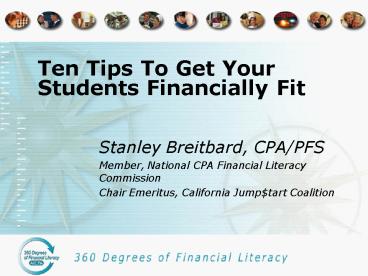Stanley Breitbard, CPAPFS - PowerPoint PPT Presentation
1 / 31
Title:
Stanley Breitbard, CPAPFS
Description:
6. Watch PBS TV Shows with Your Students. Available on the 360 Web Site. Penny Wise ... 7. Use Presentation Toolkits Available Online www.aicpa.org/financialliteracy ... – PowerPoint PPT presentation
Number of Views:91
Avg rating:3.0/5.0
Title: Stanley Breitbard, CPAPFS
1
Ten Tips To Get Your Students Financially Fit
- Stanley Breitbard, CPA/PFS
- Member, National CPA Financial Literacy
Commission - Chair Emeritus, California Jumptart Coalition
2
1. Educate Them About Americas Financial Crisis
- Financial literacy is a national problem.
- It affects every income level and social class.
- It affects young and old.
- Its color blind.
- It impacts individuals, families, businesses,
communities, states and the Federal Government.
3
Some Startling Statistics
- In 2003, 1.6 million Americans filed for
bankruptcy, the highest amount in history (Amer.
Bankruptcy Inst.). - 43 of American families spend more than they
earn (Federal Reserve). - Americans carry an average credit card debt of
more than 8,500 (Motley Fool). - The average American family saw its credit card
debt grow by 53 in the 1990s (Demos).
4
AICPA Poll
- Designed to assess financial planning knowledge
and sense of financial security among Americans - Confirmed other national studies showing serious
need for financial education
AICPA Roper Poll, May 2004
5
Percentage who have never heard of key financial
terms
- Income Replacement at Retirement 61
- ERISA 76
- Reverse Mortgage 35
- Joint/Survivor Annuities 32
- Portfolio Diversification 30
- Compound Interest 28
- 401(k) Plans 49
6
One in Three Americans In Two-Income Households
Dont Have Financial Contingency Plans Should
They Lose One Income
7
Not prepared for unexpected major expenses
- Asked how they would handle a financial emergency
they couldnt manage on their own, Americans
would - Borrow money from their family (51)
- Sell their house, car, or other thing of value
(49) - File for bankruptcy (24)
8
2. Help Students Make the Connection
- 11 of teens 12-19 have their own credit card
an additional 10 have access to a parent's
credit card. (Teenage Research Unlimited) - College students carry an average of three credit
cards with a total balance of 2,748. (Natl
Center for Educ. Stat.) - Childrens spending has increased dramatically.
Kids ages 4-12 spent 2.2 billion in 1968, 4.2
billion in 1984, 17.1 billion in 1994, and more
than 40 billion in 2002. (Packaged Facts, 2002,
The U.S. Kids Market)
9
3. Test Your Students Money IQ
- Give them the Jumptart Personal Financial Survey
- Got to www.jumpstart.org and click on Downloads
- Tests knowledge of income, money management,
saving and investing, spending and credit
10
A Failing GradeAverage Scores for 4 Surveys
- 1997 57.3
- 2000 51.9
- 2002 50.2
- 2004 52.3
- Will your students do better?
11
4. Integrate Financial Literacy into Your
Classroom
- 87 percent of college students and 90 percent of
high school students rely on their parents for
financial guidance. (Capitol One) - Only 26 of 13- to 21-year-olds reported that
their parents actively taught them how to manage
money. (Jumptart) - Only 7 states require high school students to
complete a course including personal finance
before graduating. (NCEE, April 2004, Survey of
the States) - Only 9 states require testing in personal
finance. (NCEE, April 2004, Survey of the States)
12
Financial Education Works
- Students who participated in a personal finance
game had an average test score of 2 higher than
those who did not. (Mandell and Jumptart) - People who even start thinking about financial
planning save twice as much as those who do not.
(Consumer Federation)
13
Personal Finance Clearinghouse
- Jumptart Personal Finance Clearinghouse offers
over 500 personal finance tools for educators. - Materials for grades K-12.
- Go to www.jumpstart.org and click on resources
and then Clearinghouse. - Search topic, grade level, type of material,
source
14
Personal Finance Subjects to Add to Coursework
- Value of Money
- Budgets
- Cash Management
- Banking
- Credit and Debt
- Saving
- Investing
- Interest
- Financial Planning
15
5. Take Your Students to the 360 Degrees of
Financial Literacy Web Site www.360financialliter
acy.org
- 360 Degrees of Financial Literacy is a national
effort of the CPA profession to improve the
financial understanding of Americans. - CPAs, through local programs across the U.S., are
teaching community members about personal finance
and money management.
16
(No Transcript)
17
(No Transcript)
18
Over 300 Articles
19
Over 500 FAQs
20
Over 260 Financial Tools
21
6. Watch PBS TV Shows with Your Students
- Available on the 360 Web Site
- Penny Wise
- For middle school students
- Business Building Blocks
- For high school students
22
Downloadable programs for middle and high school
students
23
7. Use Presentation Toolkits Available Online
www.aicpa.org/financialliteracy
24
8. Take Advantage of the Takin Care of Business
Package
- Easy-to-use tools for teachers to give students a
good grounding in understanding financial
concepts and how they relate to real-world
situations. - Video, teachers education handbook and student
guides
25
(No Transcript)
26
Performance Measures and Standards
- Strategic and Critical Thinking
- Problem Solving and Decision-Making
- Decision-Modeling
- Research and Reporting
- Technology
- Team Building
- Communication
27
Lessons Plans on Variety of Personal Finance
Topics
- Financial Statement Analysis
- Budgeting Forcasting
- Break-Even Analysis
- Financial Planning
- Time Value of Money
- The Purpose of Taxation
28
9. Get Yourself in Good Financial Shape with
Financial Smarts for Teachers
- http//www.financialsmarts.ucr.edu/
29
(No Transcript)
30
10. Call Your State CPA Society Local School
Programs Offered Throughout the U.S.
31
For More Information
- E-mail financialliteracy_at_aicpa.org
- Consumer Web Site www.360financialliteracy.org
- Resource Center www.aicpa.org/financialliteracy















![[PDF]⚡️Download ⚡️ The Making of Stanley Kubrick's '2001: A Space Odyssey' PowerPoint PPT Presentation](https://s3.amazonaws.com/images.powershow.com/10071517.th0.jpg?_=202407031010)



![get [PDF] Download Bad Stanley: An unauthorized parody PowerPoint PPT Presentation](https://s3.amazonaws.com/images.powershow.com/10072903.th0.jpg?_=202407041012)



![READ [PDF] Stanley Kubrick: A Biography PowerPoint PPT Presentation](https://s3.amazonaws.com/images.powershow.com/10079053.th0.jpg?_=20240716036)







